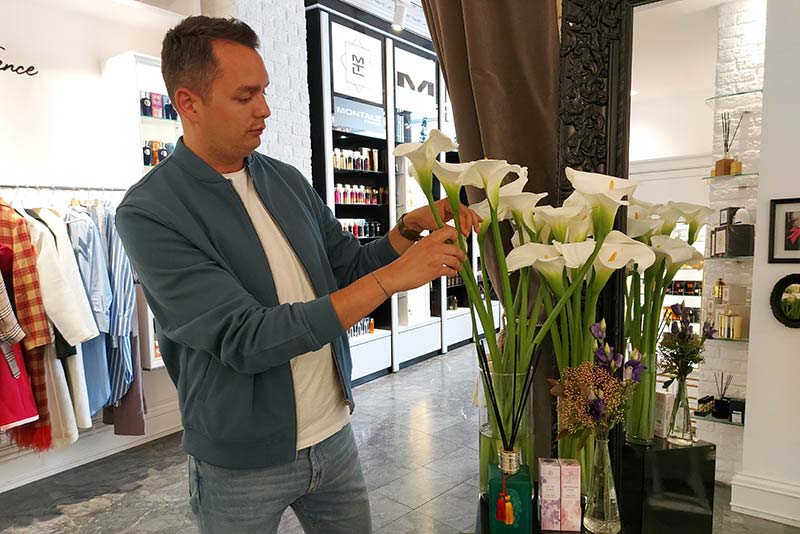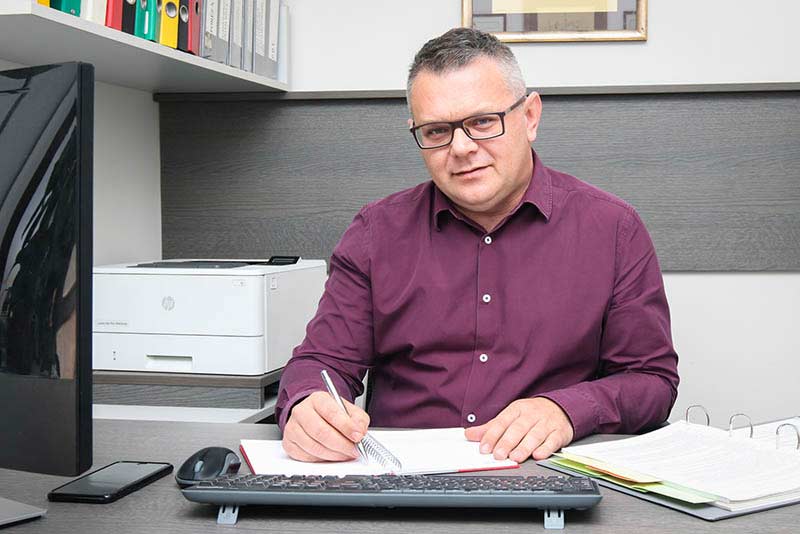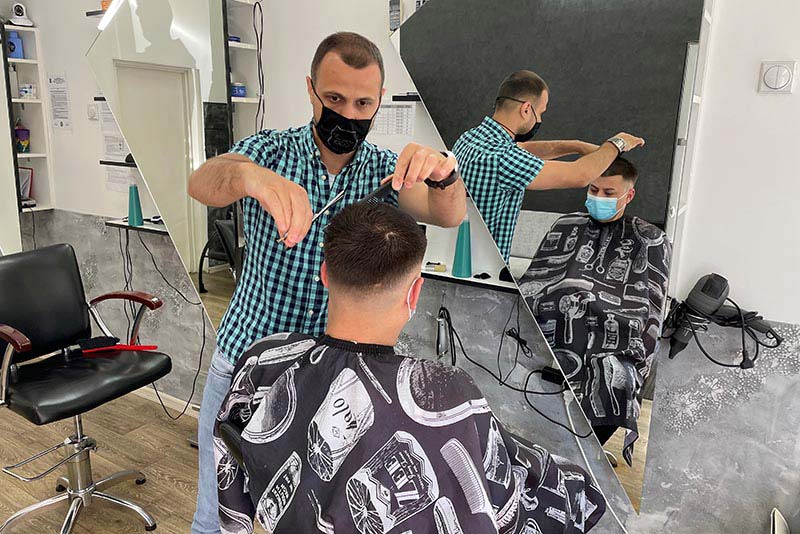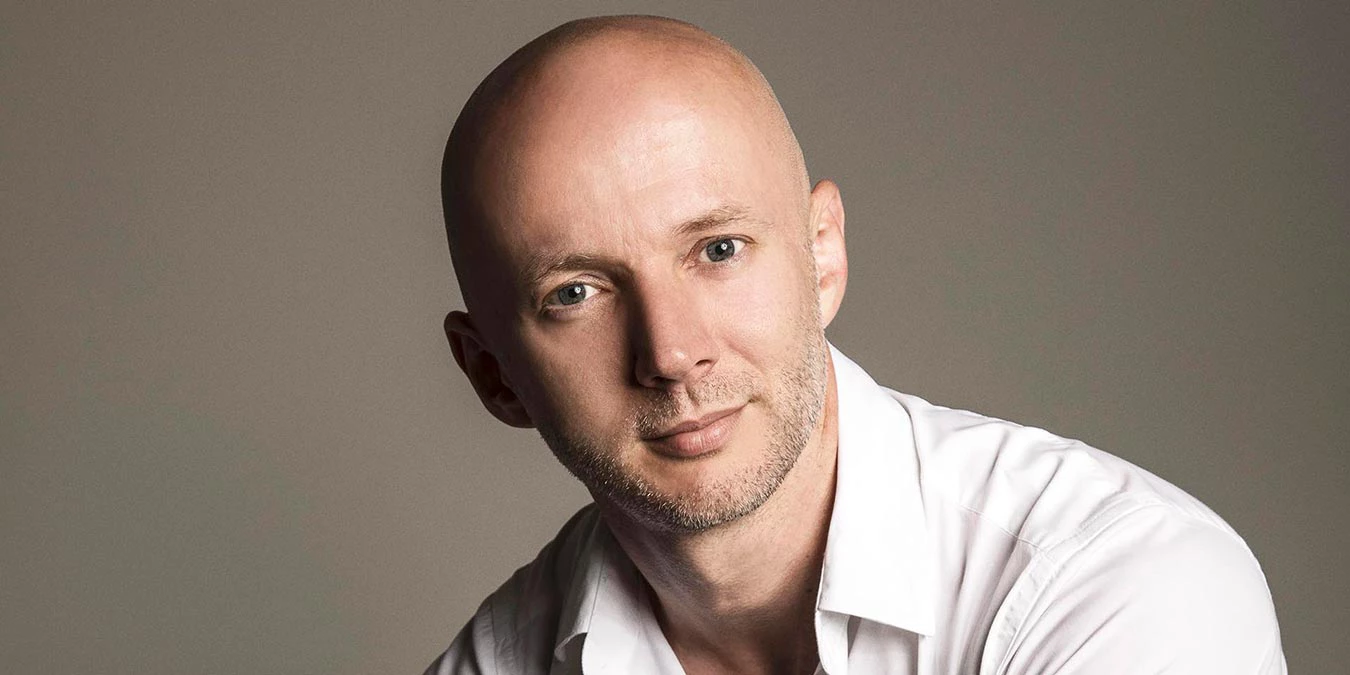By Ivan Mišković
BELGRADE, Serbia—Each time I buy a flower arrangement from my friend Dušan Stanković, I admire his great talent and skillful hands.
Before the pandemic, Stanković, owner of Belgrade-based Flowers & Design, was designing interiors, decorating spaces with flowers, and creating floral arrangements. He patiently built his company into one of the best and most sought-after florists for wedding venues, corporate celebrations, and similar large-scale events.
Stanković had high hopes for 2020 and did not anticipate a single day off from March to November. But when the pandemic forced Serbia into lockdown, business came to a standstill. Customers canceled events and borders closed, stopping all imports, including flowers.
"It was all very stressful," he said. "Some projects have been postponed, some have been canceled. During March, April, and May 2020, I had no income, and then the import of flowers started in June, so there was occasional work."

Dušan Stanković, owner of Flowers & Design. Photo by: Djordje Djoković (2019)
Since the outbreak of COVID-19, Serbia has confirmed more than 703,000 cases and more than 6,600 deaths. Employment in privately-owned firms in the Western Balkans has been "starkly affected," a World Bank report noted, with employment levels dropping by about 6 percent since December 2019. Numerous companies closed in the region.
More than a year later, Serbia is rolling out COVID-19 vaccines, employment has returned to pre-crisis levels, and some business-owners are starting to feel hopeful about the future. I spoke to four friends and business owners who provided different views of Serbia’s economy—from the hard-hit hospitality sector to the booming logistics sector.
Business not yet blooming
Stanković, the owner of the flower business, kept his operation going throughout the pandemic. He redirected money intended for business expansion to other costs, and adjusted his services to the new circumstances.
"There were no celebrations, so I reoriented my business to making flower arrangements for individuals," he said. "I receive orders, but I still can't say that everything is returning to normal."
But there is hope, he said, because mass vaccination against COVID-19 began January 19. Nearly four months later, more than 1.68 million Serbian citizens—roughly 24 percent of the country’s total population—have received both doses of the vaccine.
Even though COVID-19 cases are dropping and vaccinations are increasing, strict public health measures restricting large events and indoor gatherings are still in place in Serbia, creating uncertainty for businesses that rely on the hospitality industry, like Stanković’s.
"Now I wonder if we will start living normally in the fall and will my workload be at least 20 percent higher than at the moment," he said. "I can't talk about the lessons learned from the pandemic, because I can't even say that my business has survived. Unfortunately, everything is still uncertain."
An unexpected boost for a tax consultant
My friend Aleksandar Vasić has run the company Business Advisor (Poslovni savetnik), a tax and consulting services firm, for 16 years. He lives in Šabac, a city in western Serbia, but he also has many clients from Belgrade whose businesses were affected by the pandemic.

Aleksandar Vasić at his office in Šabac. Photo by: Jadranko Gubelic (2019)
In the first two months of the lockdown last year, Serbia imposed a daily curfew from 5 p.m. to 5 a.m. The hospitality industry—including cafes and restaurants—were closed. Tourist agencies, hotels, gyms, and companies providing bus transport between cities had no income during this period. This change in circumstance drove more business to Vasić.
"There is more work because the pandemic has brought some demanding administrative procedures," he said. "The companies reduced the number of workers, which means a lot of paperwork, and in order to receive state aid, the companies had to open new accounts," Vasić said.
Vasić added that he is grateful he did not have to lay off his workers or reduce their salaries. He is optimistic, because of the successful vaccine rollout, that life and business will resume in the fall.
"The good aspect of my job is that businesses can't function without accounting and tax services, so I don't worry much about myself," said Vasić, who got vaccinated the moment vaccines were available in Šabac. Most of his 12 employees have also been vaccinated.
"A surge in demand"
My friend Ivana Nikolić has been managing TELS Europe, a small logistics company that provides dispatch and broker services to a large sister firm that transports goods across the United States. While other businesses in Serbia were slowing down or on hold because of the pandemic, her business was taking off.
When the first COVID-19 case was recorded in Serbia on March 6, 2020, Nikolić and her four employees were worried about how to keep up with their regular activities and how the situation would develop in the U.S. She cancelled the lease on her office space and moved the business fully online.
"We witnessed a surge in demand for our services. Transport of common necessities and medical supplies intensified across the U.S., and me and my colleagues were swamped with adminstrative work," Nikolić said.

Ivana Nikolić in her office at TELS Europe. Photo by: Ognjen Janković
Nikolić said the past year felt like it flew by. She worked many extra hours, and she isn’t sure if the pace will slow down anytime soon.
"It depends largely on the vaccination rate, not only in Serbia, Europe, or the U.S., but across the globe. This world lives in a single universe, and that is now evident more than ever," she said.
She has learned many lessons in the past year. "We all need to rely on our sound business judgement to closely monitor all developments potentially affecting our businesses, and to be prepared for the worst scenario at any given moment," she said. "Only by doing that will we be resilient for some other future challenges."
Hope at the barber shop
I also talked to my long-time hairdresser Dalmir Alidini, the owner of the Studio Dača barber shop, located near my apartment in the residential Belgrade neighborhood of Zvezdara.
"The pandemic caught us all off guard, slowed us down, but I managed to save the business," Alidini told me while cutting a customer’s hair.

Dalmir Alidini of Studio Dača. Photo by: Ivan Mišković
When all hair salons were closed for a while last year, many people "cut their hair themselves, and the result was not as they expected," he said. "They rushed to us as soon as we reopened the salon, to fix their self-made hairdos. There were many funny situations those days."
Alidini said many of his colleagues at other salons haven’t fully built back their business, but he is back to working normal hours and everyone—employees and customers—takes precautions to prevent the spread of COVID-19.
"It is difficult to influence global phenomena. I am doing the best I can hoping for the near end of the pandemic," he said.
At Alidini’s salon, many of his customers are feeling optimistic about the future. I feel the same way. More and more Belgraders are going about their normal routines, shopping, playing sports, and walking through the city. It’s a big change compared to a year ago, one that inspires more hope than I’ve felt in some time.
Ivan Mišković is an IFC Communications Consultant who lives in Belgrade.
Published in May 2021
